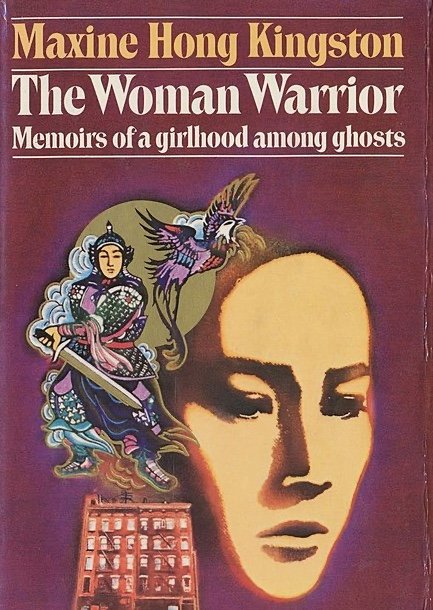The Woman Warrior: Memoirs of a girlhood among ghosts by Maxine Hong Kingston (Knopf)
When Maxine Hong Kingston’s The Woman Warrior was published in 1976, it was a literary phenomenon on several levels. Memoir was a nascent genre, just beginning to be seen as different from autobiography. Folklore belonged to scholars and was seldom blended into literary works. Most of all, young Chinese Americans had yet to find a footing in the world of best-sellers. Long before Amy Tan became famous for The Joy Luck Club or Jung Chang electrified readers with Wild Swans, Hong Kingston’s first book soared to the top of national best-seller lists and won the National Critics Circle Award. Almost fifty years after it first appeared in bookstores, it’s still selected by book clubs for discussions. It’s become a classic, praised, criticized, and loved.
Cover of the first edition of The Woman Warrior
Although its subtitle proclaims it’s a memoir, Hong Kingston mingles family history with folk tales and enigmatic glimpses of her own life. This isn’t a linear narrative as much as it is a collection of personal essays that range over space and time.
An ancestor who strayed from her marital vows in a small Chinese village and threw herself and her newborn illegitimate child into a well is used by Hong Kingston’s mother as a cautionary example of why girls should guard their chastity. Hong Kingston turns the disgraced woman into the leading figure in a vivid piece of fiction and concludes that her suicide was an act of rebellion and warfare, since she drowned herself in the village’s source of drinking water.
An extended folk tale follows the life of a mythic swordswoman whose bravery rivals Mu Lan’s. Much later, this “woman warrior’s” name is given to Hong Kingston’s mother, herself a redoubtable and unvanquished opponent in her daughter’s eyes. Brave Orchid buried two children in China and was trained as a village doctor, a respected professional before she joined her husband to begin a new family and run a laundry business in America. When her sister, Moon Orchid, comes to the U.S., Brave Orchid drives the new arrival into madness by hurling her into the deep end of a new culture. Raising her American-born children in the Chinese fashion, she creates barriers and confusion as her offspring grow up. Not until her most rebellious daughter is near adulthood does Brave Orchid explain that the girl has misunderstood why she had always been called ugly, to confuse predatory spirits who might seize the child if she was acknowledged as beautiful. “My American life,” Hong Kingston says, “ has been such a disappointment…I’m not a bad girl, I would scream." She is being raised to do battle and prevail as a victor.
For Brave Orchid, America is filled with ghosts--Taxi Ghosts, Police Ghosts, Newsboy Ghosts. In China, she knew how to battle specters. In America, she uses her children to combat these new ghostly figures. Aging in a country that she’s never accepted as her own, she insists “I would still be young if we lived in China,” ignoring her daughter’s insistence that “Time is the same from place to place.” And yet when Moon Orchid arrives, steeped in the behavior of a Chinese lady, Brave Orchid reveals how American she herself has become in her years away from China, shocking her sister as she pushes her into a new world.
Living in a household dominated by contradictions and traditions that exist only within the walls of their home, Hong Kingston and her siblings learn early on which behaviors to choose. “I want to be a lumberjack,” Hong Kingston says when she’s a little girl. To make sense of the world Brave Orchid lives in, Hong Kingston turns history into fiction and finds answers in folklore.
She writes with the evocative language of a poet, blending it with the unflinching harshness of a girl who has been raised to fight, to protect her parents, as a woman warrior. ~Janet Brown




